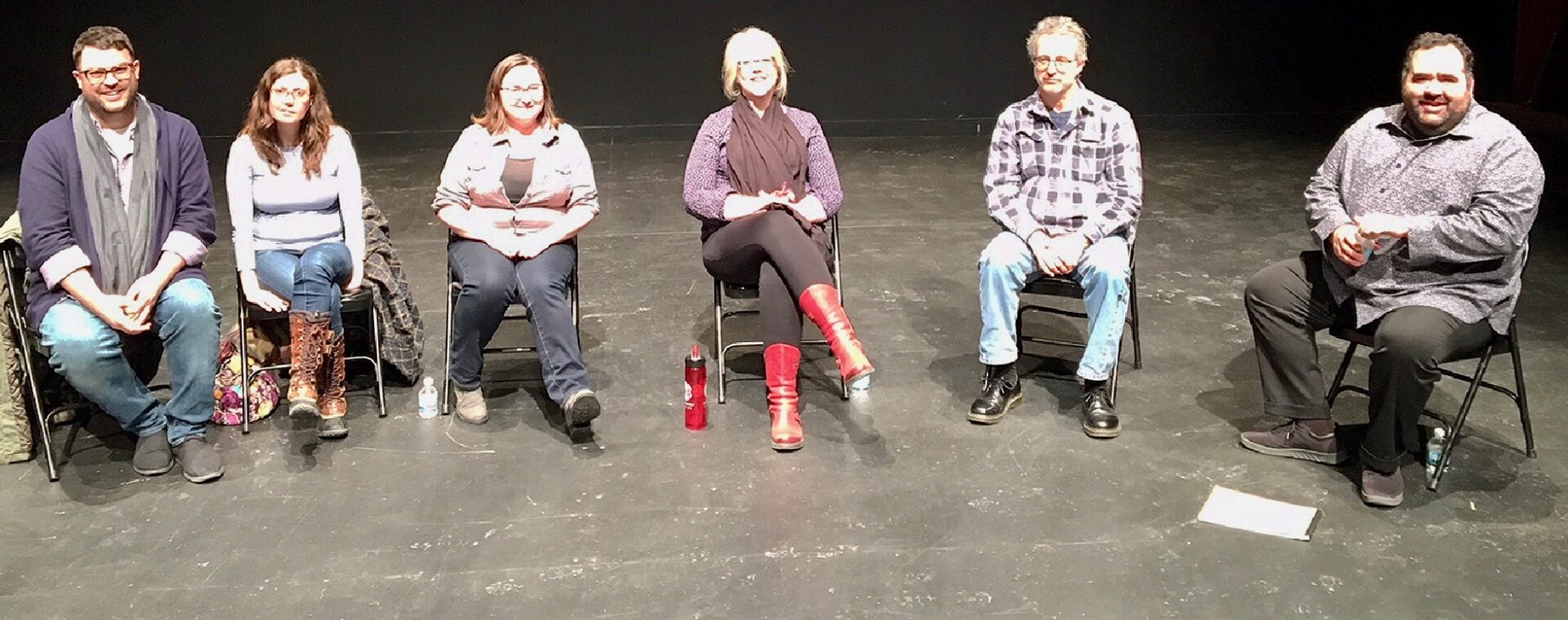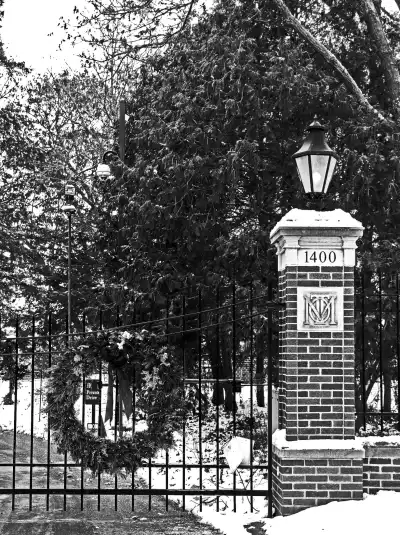By Jan Worth-Nelson
The tenured and tenure-track faculty at the University of Michigan – Flint (UMF) have begun efforts to unionize.
A group of about 16 organizers have been meeting, circulating information and membership cards, and consulting with eligible colleagues. The union would be called UMF AFT-AAUP Local 5671 [American Federation of Teachers — American Association of University Professors, affiliating with a labor union representing more than 270,000 higher education workers nationwide.
They say they are propelled by concerns about work load, campus climate, pay equity and alleged administration attempts to quash dissent. Answers to all questions posed by East Village Magazine were provided as collective replies from the organizing group through emails from Sarah Rosaen, professor of communication. The committee includes both pre- and post-tenure colleagues, though most already have tenure.
“Anyone who has signed a union card is welcome to join the Organizing Committee, and we encourage interested colleagues to do so. We are working toward building a union that is as broad and representative of tenure track faculty as possible, and so we welcome participation from as many diverse voices as possible,” they asserted.

UM Board of Regents meeting in Ann Arbor. (Photo source: screenshot from Zoom meeting)
“By our count, there are 164 UM-Flint faculty members in the tenure stream across all six academic units who fall into the pool of potential union members, Our Organizing Committee has representatives from five of the six units, but we are always welcoming more as we aim to be as diverse and representative as possible,” they said. Those “tenure stream” faculty are those hired into the tenure track with a path to tenure: assistant, associate and full professors.
It would be for the Flint campus only, “though we would be, of course, in solidarity with any efforts by our colleagues on other campuses to unionize,” they stated.
In a separate email received April 20, Rosaen said organizers are encouraged by the initial response. In just the first month of the campaign, she reported, 46% of those eligible had filled out union cards, in practice a vote for membership.
East Village Magazine requests for comment from Regents Michael Behm and Regent Chair Paul Brown have so far gone unanswered. The organizers said both Brown and Behm, who lives in Grand Blanc, attended their first “going public” meeting. That meeting was closed to the press, so EVM was unable to independently confirm what Brown and Behm said there. The Regents are the elected governing body for the University of Michigan system.
U of M Board of Regents Trustee Mike Behm speaking at a campaign event for Gov. Whitmer in the Flint Farmers Market. (Photo by Tom Travis)
But organizers reported the two regents described the university policy on neutrality toward union organizing and said that “they support, in general, the right of university employees to organize.”
GEO union strike an ongoing backdrop
The University of Michigan has collective bargaining agreements with many units, detailed here — but this would be the first, if successful, among tenure-track or tenured faculty.
The path has not always been congenial. In fact, The UM – Flint campaign is occurring simultaneously with bitter negotiations involving another union. The Graduate Employees’ Organization (GEO), the labor union representing about 2,300 graduate student instructors and graduate student staff assistants across UM’s three campuses, went on strike March 29 and was castigated by the Regents in an April 21 statement after GEO protestors stormed a restaurant where UM President Santo Ono was dining with students. As of April 22, that strike continues around a contract that expires May 1.
UM President Santa Ono, PhD. (Photo source: UM Facebook page)
Asked if UM – Flint’s top executive, Chancellor Deba Dutta wished to comment about UM – Flint’s unionizing efforts, Robb King, UM – Flint director of marketing and communications, responded, “The university has no comment at this time.”

As the organizers explained, “The university policy on neutrality allows for the formation of a union by “card check,” meaning that once a majority of employees in a potential unit have signed union cards, they can file for recognition. Essentially, the card check is the election, and this is the path we intend to take to recognition.”
Each of the eligible faculty categories for the emerging UM – Flint union are determined by criteria set out by university standards and within each department, including hiring terms, years on the job, whether they have published scholarly work, teaching performance based in part on student evaluations, and participation in institutional processes such as departmental and unit committees. It generally takes six years for a tenure-track faculty member to achieve tenure, which usually means a pay increase and job security going forward.
Many concerns animate the unionization efforts. In statements provided to EVM, organizers listed:
— Faculty governance — that is, the degree to which faculty communicate and influence institutional issues. UM – Flint is in theory is run by shared governance between administration and faculty, but in fact most faculty say in reality actual decisions are made by the administrative superstructure, sometimes without consultation with faculty.
— Concerns over workload and workplace climate — see detailed example below.
— A desire to advocate for better public funding for the institution, Of UMF’s 2022-23 budget of about $116 million, an estimated state appropriation of $26.2 million, or about 22 percent, was approved, a $784,000 increase over the previous year. The percentage of state support in the UMF’s budget has declined from a high of 67 percent in 1987. Gov. Gretchen Whitmer’s budget proposal for fiscal year 2024 includes a proposed 4% increase for all three UM campuses.
— Pay that does not keep up with inflation, As detailed in a recent EVM report, UM – Flint faculty received an average of 3.5% for the current year. Who gets what varies widely, even among tenure-track and tenured faculty.
The average UM – Flint full-time salary, according to 2021-2022 numbers from umsalary.info, was $69,8K. According to one private online workplace survey site, the average pay of UM – Flint professors is $139,000; to reach that range, a faculty member likely would be tenured or hold an executive position. The UMF’s top executive, Chancellor Dutta, received a 15 percent pay raise to $469,000 this year; 13 others had pay of $200K or more in 2021-2022.
— Threats to tenure. In a Winter, 2023 website post of the American Association of University Professors (AAUP), Marc Stein wrote, “In the last decade, conservatives have launched multiple attacks on faculty tenure in higher education. As we understandably focus on these episodes in states such as Florida, Georgia, Louisiana, Missouri, South Dakota, Texas, and Wisconsin, we too readily ignore slow and steady developments that are destroying tenure in California and other progressive states.”
— Fear of arbitrary retaliation by administrators. At an October, 2022 Board of Regents meeting, a former dean who had been fired complained of bullying and administrative chaos, and was joined by others alleging similar experiences and retaliation for dissent.
— Concern over sudden and unilateral policy changes. Faculty in the College of Arts and Sciences (CAS), for example, recently reported a sudden move of several departments from CAS into the new College of Innovation and Technology (CIT), a decision allegedly made without consultation — or fait accompli notice — with the Faculty Senate Council.
“In the nine months we have been organizing,” they report, “we have come to realize that, across ranks and units, we have much more in common than we have dividing us. And whatever our specific issues, so many of us feel undervalued and unheard.
“The UMF AFT-AAUP is a vehicle for us to work together in our common interests, refuse to allow ourselves to be pit against each other, and recognize that all of our fates are tied together, as well as entwined with the fates of our students and the community as a whole.”
Not all faculty fall into the tenure stream.
There actually are more non-tenure-track (NTT) faculty than tenure-track at UM-Flint — about 250 as of the 2022-23 records. In general, NTT faculty get paid less and have less job security than those in the tenure track.

French Hall on the UM-Flint campus in downtown Flint. (Photo by Tom Travis)
That group unionized in 2004 after a tempestuous campaign in the early 2000s in an effort paralleling what is happening now with with the tenure-track faculty. That union, the Lecturers Employee Organization (LEO), applies to all three UM campuses, and has produced a long list of gains in working condition, health care benefits, and a tripling in minimum pay since 2003.
While a “Strategic Transformation” process underway, led by Chancellor Dutta at the downtown Flint campus since last fall has raised numerous concerns about the lives and work of faculty and the direction of the university, organizers said their efforts are in fact “inspired by concerns faculty have held and voiced for a much longer period of time. That said, the Strategic Transformation has provided a nice moment to reflect upon our place in the university and broader community.”
“In some ways you might say that we see unionization as part of the Strategic Transformation, an effort that will make UM-Flint a better institution that is more sustainable and responsive to all of its constituents: students, community, faculty, and staff,” they said.
Many faculty have been actively involved in the Strategic Transformation process, wrestling along with the rest of the institution as the campus faces several challenges, including a $7.3 million deficit and a 25 percent drop in enrollment over the last seven years. Last fall, Dutta predicted that deficit might surge to $13.9 million in the 2023 fiscal year. Some have bitterly critiqued a contract with the Huron Consulting group to run the process. Huron is a huge international higher education consulting firm based in Chicago that has resulted in a number of similar institutions slashing faculty, support staff, and liberal arts programs.
Asked for examples and detail about some of the nascent union’s concerns, organizers emphasized that those would be more fleshed out by members as the union coalesces.
“Our list of concerns is broad and compelling, having come out of nine months of conversations with colleagues. We remain struck by how many of these concerns are shared across units. However, it is difficult to offer much detail at the moment. This is because how we address such issues will be for our membership to decide through collective processes once we are recognized as a union.”
However, they suggested one set of developments regarding faculty workload illustrates what they see as the need for unionization.
“Last academic year, the Provost’s Office developed, without faulty consultation, a draft workload proposal that sought to alter expectations regarding how much teaching, creative and scholarly work, and service should be counted as a percentage of overall effort for tenure-stream faculty. In addition, the proposal appeared to involve punitive measures for post-tenure faculty, in particular the possibility of increased teaching assignments for those deemed not productive enough in research.
“When leaked to faculty, the draft policy raised many questions, from how it might violate the principles of tenure to why administrators did not consult faculty during development. In response, UM-Flint’s AAUP chapter offered a statement to the Faculty Senate Council. Later, an FSC representative presented related concerns before the executive arm of UM’s tri-campus faculty governance system, SACUA, which later issued a resolution on the matter.
“As a result, the Provost’s Office pulled the university-wide draft proposal and directed academic units to develop their own workload policies. But we now hear from colleagues that these unit-level proposals mirror the original put forward by the administration. Amid this and reports of still other kinds of changes to workload, consultation with tenure-stream faculty, again, remains minimal. This experience with proposed workload policies over the past two years intersects with many of the concerns that have brought us together.
“To be clear, developing and/or revising expectations of effort is not the problem. What alarms us is the lack of authentic consultation with faculty, the disregard of existing institutions of faculty governance, the arbitrariness with which changes are being made or implemented, the ways in which the proposed policies impact the integrity of tenure, and the lack of concern for and devaluing of our work.
“If UM-Flint tenure-stream faculty were already unionized, the administration would not be in a position to unilaterally advance such changes in the middle of an academic year. Instead, any work-related measure would have to be negotiated via collective bargaining. This would also strengthen faculty governance, ensuring that the group most affected by the potential changes, i.e., tenure-stream faculty, was engaged in authentic consultation.
“Thus, the unionization of tenure-stream faculty would strengthen the institution and its ongoing transformation. It would do this by ensuring that the administration and tenure-stream faculty act as partners, supporting faculty governance on our campus, and ensuring that our labor and contributions to students, colleagues, and community are valued. Indeed, the UMF AFT-AAUP has already hosted a series of workshops on workload. At these workshops, over 100 faculty and staff colleagues developed principles for a workload policy that would both allow for changes and value our time, work, and efforts.”
Part of a Flint tradition
Organizers note their efforts have particular significance historically for the city of Flint, where a nationally momentous sit-down strike by Fisher Body/General Motors employees in 1936 led to formation of the United Auto Workers (UAW), and where union efforts through the decades since have yielded layer upon layer of worker benefits and political influence.
“There are faculty within our ranks who are the proud children and grandchildren of union members, including those who participated in the Sit-Down Strike,” the organizers wrote. “We are humbled by this, and we hope that we might, in some small way, take a place in Flint’s storied history of organized labor.”
The organizers said they see their efforts in a context of a larger movement toward revitalizing the labor movement — in Flint and nationally.

UM-Flint Recreation Center. (Photo by Tom Travis)
“At our going public event, the presidents of faculty unions at Eastern Michigan and Wayne State welcomed us into this unique moment within higher education, which has seen 25,000 new workers organized across the country,” they wrote.
“This recent rise in labor activism within higher education has been motivated in part by the desire to leverage the shared interests of faculty, students, staff, and the community at large. We know that our success depends on the success of these partners, and we see our efforts as being geared toward strengthening our institution and its positive impact in Flint and the broader Flint community. A stronger faculty means a stronger campus, and together we can all work towards a stronger Flint.”
As detailed in a Jan. 28 EVM story, the UM – Flint campus is a major downtown employer:
According to (constantly changing) data from the UMF’s Officer of Institutional Analysis and the UM Human Resources Information System, as of Nov, 1, 2022, UM – Flint employs 1,013 people, with 717 (71 percent) full time and 296 part time (29 percent).
Of those 494 are Faculty, in the following categories:
- 195 Tenured/Tenure Track Faculty (which includes 23 Academic/Administrators who are tenured faculty members and 1 Emeritus Faculty who is actively working)
- 228 Lecturers
- 8 LEO-GLAM (Librarians, Curators and Archivists)
- 63 Clinical and Adjunct Clinical Faculty”
Here is the UMF AFT-AAUP Mission Statement: UMF AFT-AAUP Mission Statement
EVM Consulting Editor Jan Worth-Nelson can be reached at janworth1118@gmail.com. As a UM – Flint non-tenure-track faculty in the English Department for 23 years, Worth-Nelson was part of the successful organizing effort to establish the the Lecturers’ Employee Organization (LEO) in the early 2000s. She retired in 2014.










You must be logged in to post a comment.